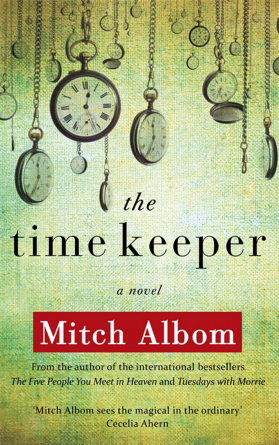Print Edition: October 3, 2012
 If someone were to ask you what you value most in life, what would you respond with? Family? Friends? Your career? All of these are of substantial importance to most people, but then, think about how precious your hours, your minutes, your seconds are. Mitch Albom’s The Time Keeper brings to light this very thing which many of us take for granted: time.
If someone were to ask you what you value most in life, what would you respond with? Family? Friends? Your career? All of these are of substantial importance to most people, but then, think about how precious your hours, your minutes, your seconds are. Mitch Albom’s The Time Keeper brings to light this very thing which many of us take for granted: time.
Initially set long before the idea of time existed, this short novel’s protagonist, Dor, is a man who is fixated on the concept of counting and recording. All his life, he is obsessed with keeping track of the rising and falling of the sun, always measuring with the various contraptions he builds. Little does he know that he has created the first means of calculating and documenting time.
Displeased by this, God punishes Dor for discovering his precious gift and locks him in a cave for centuries, making him prisoner to endless amounts of voices, begging for more minutes on this Earth. He is only allowed freedom once he has brought two people—one who wants more time on this earth, and one who wants less—together and taught them the value of a minute. From this point forward, he would be known as Father Time.
These two people are polar opposites who, by chance, stumble upon Dor at completely different times. Sarah Lemon, an awkward high school senior, is desperate to end her life after the boy of her dreams completely shuts her out. Victor Delamonte, an 87-year-old billionaire, yearns to find a way to live forever after being told he only has weeks left. Though the two are dissimilar in stature and mindset, both fail to comprehend the importance to time. Through a series of radical events, Dor brings both characters together, causing them realize the sheer importance of the hours and days they are given.
Right from the beginning, The Time Keeper was very easy to get hooked on. The plot line is straightforward, but very impacting, and the short, glimpse-like chapters keep you interested. The purpose of each chapter is to reveal a specific part of one character’s story, right until the climax of the novel.
This technique works effectively for its purpose, as it keeps the reader in constant anticipation of what will come next for each character. Albom does an even better job on the story structure of the novel, as he uses techniques like short paragraphs and bolded sentences to relay the significant messages he wants the reader to grasp.
The characters are generally quite basic, but this aspect is necessary in order for the moral of the narrative to shine through. Other than Dor, Ablom seems to base his characters off of stereotypes; Sarah is the self-conscious teenaged girl who falls for the popular boy at school, and Victor is the rich old man who makes his employees work late on weekends. That is probably why Albom made Dor’s gentle and growing personality contrast that of the other characters’ – in order to display the message within the story more significantly.
The part that is bothersome, though, is the quick change of heart from two of the main characters, nearer to end of the novel. While experiencing a flash-forward to their potential futures, the two suddenly change their minds and dismiss the very thought of their earlier plans.
It seems as though it came straight out of A Christmas Carol, to be honest. It was just too sudden for it to be realistic, almost as if Albom wanted to find a quick way to wrap it up. It doesn’t alter the overall impact that the novel gives the reader, but it was still a flaw that taints the ending.
If you’re looking for a short read with a provoking theme, this is your story. The Time Keeper uses conventional characters that we can easily familiarize ourselves with in order to get a specific message across: we need to cherish the moments we are given. We only have one life to live, no more and no less, so we must use it wisely. Through the characters’ mistakes and realization, Albom made this message of appreciating our moments on earth one that will stick with you, long after you’ve finished the last sentence.


